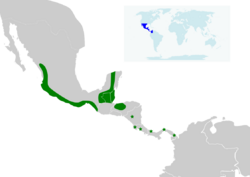Biology:Mexican dog-faced bat
| Mexican dog-faced bat | |
|---|---|
| Scientific classification | |
| Domain: | Eukaryota |
| Kingdom: | Animalia |
| Phylum: | Chordata |
| Class: | Mammalia |
| Order: | Chiroptera |
| Family: | Molossidae |
| Genus: | Cynomops |
| Species: | C. mexicanus
|
| Binomial name | |
| Cynomops mexicanus Jones & Genoways, 1967
| |

| |
| Synonyms | |
| |
The Mexican dog-faced bat (Cynomops mexicanus) is a bat species of the family Molossidae from Central America.[2] It is found from Nayarit in Mexico to Costa Rica at elevations up to 1500 m.[1] It was formerly considered a subspecies of C. greenhalli.[2] It roosts in deciduous and evergreen forest, and is usually found near small bodies of water.[1]
Taxonomy and etymology
| |||||||||||||||||||||||||||
| Phylogeny of Cynomops[3] |
It was described as a subspecies of Greenhall's dog-faced bat (Cynomops greenhalli) in 1967 by Jones and Genoways. At the time, Greenhall's dog-faced bat was in the genus Molossops, so the Mexican dog-faced bat initially had the trinomen Molossops greenhalli mexicanus.[4] When Cynomops was recognized as a valid genus rather than a subgenus of Molossops, Greenhall's dog-faced bat became part of the new genus. However, it wasn't until 2002 that the Mexican dog-faced bat was promoted to full species status. It is the most basal member of Cynomops.[3] Its species name "mexicanus" is Latin meaning "from Mexico."
Description
It is a relatively large free-tailed bat. Total length is 90–107 mm (3.5–4.2 in); forearms and tails are 34.6–36.8 mm (1.36–1.45 in) and 28–33 mm (1.1–1.3 in) long, respectively. It weighs 16.2–16.5 g (0.57–0.58 oz).[4] Fur color is dark brown or reddish brown overall, but lighter on the stomach.
Biology
It is nocturnal, and roosts in sheltered places during the day such as inside hollow trees.[4]
References
- ↑ 1.0 1.1 1.2 Rodriguez, B.; Miller, B. (2015). "Cynomops mexicanus". IUCN Red List of Threatened Species 2015: e.T136611A21987867. doi:10.2305/IUCN.UK.2015-4.RLTS.T136611A21987867.en. https://www.iucnredlist.org/species/136611/21987867. Retrieved 19 November 2021.
- ↑ 2.0 2.1 Simmons, N.B. (2005). "Order Chiroptera". in Wilson, D.E.; Reeder, D.M. Mammal Species of the World: A Taxonomic and Geographic Reference (3rd ed.). Johns Hopkins University Press. p. 437. ISBN 978-0-8018-8221-0. OCLC 62265494. http://www.departments.bucknell.edu/biology/resources/msw3/browse.asp?id=13801609.
- ↑ 3.0 3.1 Peters, Sandra L; Lim, Burton K; Engstrom, Mark D (2002). "Systematics of Dog-Faced Bats (Cynomops) Based on Molecular and Morphometric Data". Journal of Mammalogy 83 (4): 1097. doi:10.1644/1545-1542(2002)083<1097:SODFBC>2.0.CO;2.
- ↑ 4.0 4.1 4.2 Jones Jr, J. K.; Genoways, H. H. (1967). "A new subspecies of the free-tailed bat, Molossops greenhalli, from western Mexico (Mammalia: Chiroptera)". Proceedings of the Biological Society of Washington 80: 207–210. https://biodiversitylibrary.org/page/34589563.
External links
Wikidata ☰ Q751313 entry
 |


